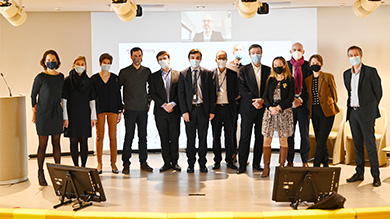Anne-Christine Champion is Global Head of Real Assets at Corporate & Investment Banking, and here she looks at the new needs and challenges for the strategic sectors she manages at Natixis i.e. infrastructure, energy, real estate, aviation.
ANNE-CHRISTINE
CHAMPION
Co-Head of Natixis Corporate & Investment Banking and member of the senior management committee.
You graduated from the Ecole Normale Supérieure and also have a qualification in physics. Does this unusual profile help you in your role as Global Head of Real Assets for Natixis?
My academic background focused on science, research and innovation, and these are the aspects that have always driven me. Since I joined the bank, I have seen that this pursuit of innovation lies at the very center of our business lines. Over the past ten years, all stakeholders and executives have been faced with an extremely complex environment, and the ability to adapt and innovate is crucial in successfully rolling out a company’s – or a bank’s – strategy.
Yes, the world really is changing, and has been for some time?
The world financial crisis has made for a challenging environment for banks since 2007-2008, while other factors have added to this, creating disruption in the economic and social context and leading to even greater complexity. We now have to realize that the environment is changing and we need to take this on board when developing our long-term strategy. Meanwhile, today’s health and social crisis is utterly unprecedented if we compare its social impact and the uncertainty it has fueled with previous crises, as it is worldwide in scope and affects entire sectors of the economy.
Can you tell us about Natixis’ mega trends project?
Some mega trends – which already existed – have stepped up further due to Covid-19. They are a bit like waves, which hit with massive force as they are caused by groundswell i.e. energy transition, changes in society such as remote working, e-commerce, the ageing population in certain regions of the world, the importance of healthcare for all citizens and companies, etc. These trends all create both challenges and opportunities, particularly for infrastructure, energy, real estate, healthcare, logistics for e-commerce, telecoms for data centers due to robust growth in data use. Over recent years, Natixis has developed its expertise to support our clients in preparing for these transformations, in terms of advisory services and in raising debt and equity capital.
In this challenging context, what exactly do your clients need in the strategic sectors you manage – aviation, energy, real estate and infrastructure?
These sectors have undergone diverse effects from the current crisis. Aviation is hit by an emergency of unprecedented scale. Air transportation had previously enjoyed forceful and steady growth, but this came to a very abrupt halt: in April this year, 65% of the world aircraft fleet was grounded, while just a year ago, no-one could have envisaged or considered this type of scenario. The figure fell to 35% in September, although there is still the issue of the number of passengers on each flight. This industry has been very hard hit and will continue to struggle for the next two to three years.
What about the hotel sector?
Like aviation, the hotel sector has taken a severe dent from the current crisis, and it will take time for the industry to get back on its feet. Growth will of course recover, but it will be less buoyant and habits will change. This crisis is having some really massive effects: traffic may recover with domestic travel again, but worldwide the situation is at a standstill.
Real estate looks more resilient for the moment
The situation varies from one segment to another. On the office market, the chasm is widening between high-quality assets for the future – buildings that can offer strong access to communications networks, transport and spaces that can be adapted easily ─ and the other ones. The good news is that the market for real assets is very fluid – infrastructure and real estate. The environment is the catalyst for these investments, and financing can be provided by the private sector.
Which sectors are still doing best?
Renewable energy, telecoms infrastructure, healthcare, logistics, the environment, the new digital world, all sectors that support technological innovation, and the arrival of tech are in the best position. New opportunities are emerging, investment needs are gathering speed, and we can see governments’ and states’ determination to press forward with the energy transition. A good example is the French €7 billion hydrogen program. However, even in these sectors, there will be winners and losers, so some companies have an opportunity to emerge as leaders. Our expertise involves identifying them and being able to support them, and our role in this crisis is to work to support our clients.
What do you advise them?
Each situation is different, and so our advice will be different – and often customized – depending on each company’s financial status i.e. invest very quickly, or wait for the sector to reach a certain point. The current crisis can lead to liquidity needs, and support is available in the short term, particularly in France via state-guaranteed loans. We are also very active on fund-raising and funding management for both the short and medium term, and additionally we support our clients via M&A advisory and capital raising. But regardless of the sector or geography, the crucial aspects for any industry are leadership and the ability to innovate and adapt. Teams’ diversity and staff’s mindset are essential in adapting, problem-solving and developing solutions with greater agility and performance.

















